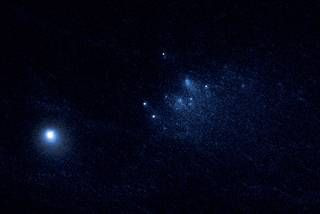Hubble Telescope Images Show Comet Dying As It Orbits The Sun [NASA PHOTOS]

Over three days in January, the Hubble Space Telescope was able to capture images of a comet dying. The pictures show Comet 332P — an icy body that is roughly 4.5 billion years old — as it lost building-sized chunks of mass. The breakup is just one the latest events in what scientists say will be a long death for the comet, according to media reports Monday.
Researchers say that the photos are some of the sharpest pictures taken yet of a comet as it breaks up. Comet 332P is a leftover from the construction of the solar system and, while it was able to last for billions of years, a new orbit that pulls it just outside the path of Mars means it is doomed. With closer proximity to the sun, the icy body heats up and essentially unglues as jets of gas and dust erupt out of it. Those jets further the problem, acting as rocket engines that make the rock spin faster and eject more debris, a Space Telescope Science Institute release said.
Photos show a comet disintegrating. pic.twitter.com/NKGfUz9XVf
— Clark Mindock (@ClarkMindock) September 19, 2016
The new photos are helping scientists figure more out about that process.
“We know that comets sometimes disintegrate, but we don't know much about why or how they come apart,” David Jewitt, a professor of physics and astronomy at the University of California at Los Angeles, said in a statement Thursday. “The trouble is that it happens quickly and without warning, and so we don't have much chance to get useful data. With Hubble's fantastic resolution, not only do we see really tiny, faint bits of the comet, but we can watch them change from day to day. And that has allowed us to make the best measurements ever obtained on such an object.”
The new images show the comet, which has a nucleus estimated to be about 1,600 feet long, breaking up and adding to its debris trail. The chunks of icy rock captured by Hubble are moving away from one another at a rate of a few miles per hour, or similar to the walking speed of an adult.
© Copyright IBTimes 2025. All rights reserved.






















